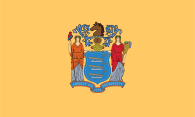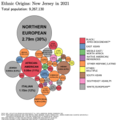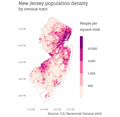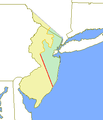The flag of New Jersey New Jersey state located in both the Mid-Atlantic and Northeastern regions of the United States, at the geographic hub of the heavily urbanized Northeast megalopolis . New Jersey is bordered to the northwest, north, and northeast by New York State ; on its east, southeast, and south by the Atlantic Ocean ; on its west by the Delaware River and Pennsylvania ; and on its southwest by Delaware Bay and Delaware . At 7,354 square miles (19,050 km2 ), New Jersey is the fifth-smallest state in land area , but with over 9.5 million residents as of 2024 U.S. Census Bureau estimates, its highest population ever, the state ranks 11th in population . The state capital is Trenton , and the state's most populous city is Newark . New Jersey is the only U.S. state in which every county is deemed urban by the U.S. Census Bureau, and is the most densely populated U.S. state.
New Jersey was first inhabited by Paleo-Indians as early as 13,000 B.C.E. The Lenape were the dominant Indigenous group when Europeans arrived in the early 17th century, and they were subdivived into dialectal groups such as the Munsee, in the north, and the Unami and the Unalachtigo, elsewhere. Dutch and Swedish colonists founded the first European settlements in the state, with the British later seizing control of the region and establishing the Province of New Jersey , named after Jersey . The colony's fertile lands and relative religious tolerance drew a large and diverse population. New Jersey was among the Thirteen Colonies that supported the American Revolution , hosting several pivotal battles and military commands in the American Revolutionary War . New Jersey remained in the Union during the American Civil War and provided troops, resources, and military leaders in support of the Union Army . After the war, the state emerged as a major manufacturing center and a leading destination for immigrants, helping drive the Industrial Revolution in the U.S. New Jersey was the site of many industrial, technological, and commercial innovations . Many prominent Americans associated with New Jersey have proven influential nationally and globally, including in academia, advocacy, business, entertainment, government, military, non-profit leadership, and other fields. (Full article...
The
Battle of Iron Works Hill , also known as the
Battle of Mount Holly , was a series of minor skirmishes that took place on December 22 and 23, 1776, during the
American War of Independence . They took place in
Mount Holly, New Jersey , between an American force mostly composed of colonial militia under Colonel
Samuel Griffin and a force of 2,000
Hessian mercenaries and
British Army regulars under
Carl von Donop .
While the American force of 600 was eventually forced from their positions by the larger British force, the action prevented Donop from being in his assigned base at Bordentown, New Jersey and in a position to assist Johan Rall 's brigade in Trenton, New Jersey when it was attacked and defeated by George Washington after his troops crossed the Delaware on the night of December 25–26.
Finn Michael Westby Caspersen Sr. Peddie School , Brown University and Harvard Law School , he was chairman and chief executive of Beneficial Corporation , one of the largest consumer finance companies in the United States . After an $8.6 billion acquisition of Beneficial by Household International in 1998, Caspersen ran Knickerbocker Management, a private financial firm overseeing the assets of trusts and foundations.
As a philanthropist, Caspersen donated tens of millions of dollars to the Peddie School , Brown, Harvard, and Drew University , while overseeing the Hodson Trust, which benefitted four institutions in Maryland. He described education as his "particular love" and regarded it as "an investment in the future—an investment in human capital." Buildings and endowed professorships have been named in his honor. Caspersen's philanthropy extended to rowing and equestrian sports, and service to the United States Equestrian Team Foundation , Princeton National Rowing Association, and the National Rowing Foundation. (Full article...
The following are images from various New Jersey-related articles on Wikipedia.
Image 1 Ethnic origins in New Jersey (from
New Jersey )
Image 2 Cranberry harvest (from
New Jersey )
Image 3 Modern map which approximates the relative size and location of the settled areas of New Netherland and New Sweden. (from
History of New Jersey )
Image 4 Washington Rallying the Americans at the Battle of Princeton , a portrait by
William Ranney depicting
George Washington rallying
Continental Army troops at the
Battle of Princeton in January 1777 (from
New Jersey )
Image 5 The Great Falls of the Passaic River (from
History of New Jersey )
Image 6 New Jersey population density as of 2020 (from
New Jersey )
Image 9 New Brunswick , nicknamed the
Hub city and the
Healthcare City , is a focus city for academia,
healthcare , and culture in New Jersey. (from
New Jersey )
Image 10 Sunset on the beach at
Atlantic City , an
oceanfront resort and the nexus of New Jersey's
gambling industry (from
New Jersey )
Image 11 A heat map showing median income distribution in New Jersey by county (from
New Jersey )
Image 12 2024 U.S. presidential election results by county in New Jersey
Democratic
Republican
(from
New Jersey )
Image 14 Map of counties in New Jersey by racial plurality, per the 2020 census
Non-Hispanic White 30–40%
40–50%
50–60%
60–70%
70–80%
80–90%
Black or African American 40–50%
Hispanic or Latino 40–50%
(from
New Jersey )
Image 15 MetLife Stadium in
East Rutherford , one of only two
NFL stadiums shared by two teams, is home to the
New York Giants and
New York Jets . (from
New Jersey )
Image 16 A letter sent to
Senate Majority Leader Tom Daschle containing anthrax powder caused the deaths of two postal workers. (from
History of New Jersey )
Image 17 Map of New Jersey's major transportation networks and cities (from
New Jersey )
Image 18 The original provinces of West and East New Jersey are shown in yellow and green respectively. The Keith Line is shown in red, and the Coxe and Barclay Line is shown in orange. (from
History of New Jersey )
Image 19 The
George Washington Bridge , connecting
Fort Lee (foreground) in
Bergen County across the
Hudson River to
New York City (background), is the world's busiest motor vehicle bridge. (from
New Jersey )
Image 20 At 69.6 mi (112.0 km) in length,
Raritan River is the longest river entirely within New Jersey, flowing from
Raritan Valley near
Clinton (above), eastward to
Raritan Bay and the
Atlantic Ocean . (from
New Jersey )
Image 21 Delaware Water Gap is shared between
Warren County and neighboring
Pennsylvania . (from
New Jersey )
Image 22 High-rise residential complexes in the borough of
Fort Lee (from
New Jersey )
Image 23 New Jersey is named after the
English Channel island of
Jersey (from
History of New Jersey )
Image 24 The
Atlantic City boardwalk seen from
Caesars Atlantic City , which opened in 1870 as the world's first
boardwalk At
5+ 1 ⁄2 miles (8.9 km) long, it is also the world's longest and busiest boardwalk. New Jersey is home to the world's highest concentration of boardwalks.
Image 26 The design of the golden-domed
New Jersey State House in
Trenton differs from most other U.S. state houses in not resembling the
U.S. Capitol . (from
New Jersey )
Image 27 Skyscrapers in
Jersey City , one of the most
ethnically diverse cities in the world (from
New Jersey )
Image 28 George B. McClellan , was an American soldier,
Civil War Union general, civil engineer, railroad executive, and politician who served as the 24th
governor of New Jersey . (from
History of New Jersey )
Image 29 Nassau Hall at
Princeton University , an
Ivy League university and one of the world's most prominent research institutions, served briefly as the U.S. Capitol in the 18th century. (from
New Jersey )
Image 31 Federal Courthouse in
Camden , which is connected to
Philadelphia via the
Benjamin Franklin Bridge in the background (from
New Jersey )
Image 32 A map of
New Netherland and
New Sweden in present-day New Jersey during the
colonial era (from
New Jersey )
Image 34 The
Jersey Shore extends inland from the
Atlantic Ocean into its many
inlets , including
Manasquan Inlet , looking westward at
sunset from the
jetty at
Manasquan (from
New Jersey )
Image 36 Results of the 1910 gubernatorial election in New Jersey. Wilson won the counties in blue. (from
History of New Jersey )
Image 37 The Province of New Jersey, Divided into East and West, commonly called The Jerseys ,
1777 map by
William Faden (from
History of New Jersey )
Image 38 A 1950s-style
diner in
Orange (from
New Jersey )
Image 40 Cape May–Lewes Ferry connects New Jersey and
Delaware across
Delaware Bay . (from
New Jersey )
Image 41 A fleet of naval forces being constructed in the Camden shipyards (1919) (from
History of New Jersey )
Image 42 Military map by
William Faden with troop movements during the
Ten Crucial Days (from
History of New Jersey )
Image 43 The
Hindenburg just moments after catching fire (1937) (from
History of New Jersey )
Image 45 India Square in the
Marion Section of
Jersey City is home to the highest concentration of
Asian Indians in the
Western Hemisphere . (from
New Jersey )
Image 46 Paterson , sometimes known as Silk City, has become a prime destination for an internationally diverse pool of immigrants, with at least 52 distinct ethnic groups. (from
New Jersey )
Image 48 Old Queens at
Rutgers University , the largest state university system in New Jersey (from
New Jersey )
Image 49 Map of the 107-mile-long (172 km)
Morris Canal , which crosses the state (from
New Jersey )
Image 51 Michael Schleisser and the "Jersey man-eater" as seen in the
Bronx Home News (1916) (from
History of New Jersey )
Image 52 New Jersey's telephone
area codes (from
New Jersey )
Featured articles
Featured lists
Good articles
Category puzzle Select [►] to view subcategories














































































